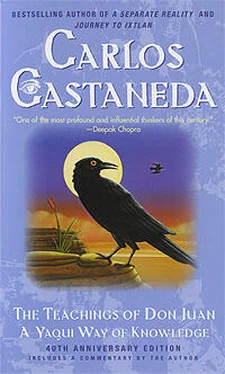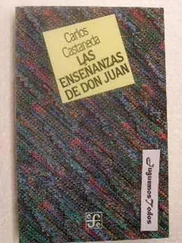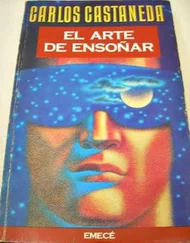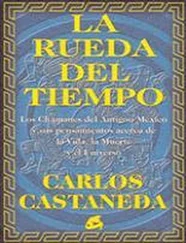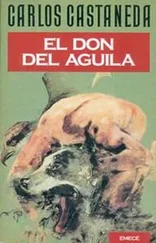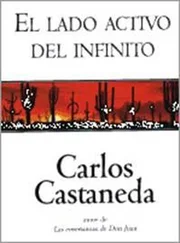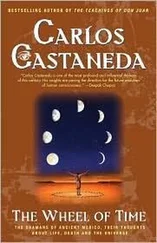An ally was tamable
The idea that an ally was tamable implied that as a power it had the potential of being used. Don Juan explained it as an ally's innate capacity of being utilizable; after a sorcerer had tamed an ally he was thought to be in command of its specialized power which meant that he could manipulate it to his own advantage. An ally's capacity of being tamed was counterposed to the incapacity of other powers, which were similar to an ally except that they did not yield to being manipulated.
The manipulation of an ally had two aspects: (1) an ally was a vehicle; (2) an ally was a helper.
An ally was a vehicle in the sense that it served to transport a sorcerer into the realm of non-ordinary reality. Insofar as my personal knowledge was concerned, the allies both served as vehicles, although the function had different implications for each of them.
The overall undesirable qualities of the ally contained in Datura inoxia, especially its quality of unpredictability, turned it into a dangerous, undependable vehicle. Ritual was the only possible protection against its inconsistency, but that was never enough to ensure the ally's stability; a sorcerer using this ally as a vehicle had to wait for favourable omens before proceeding.
The ally contained in Psilocybe mexicana, on the other hand, was thought to be a steady and predictable vehicle as a result of all its valuable qualities. As a consequence of its predictability, a sorcerer using this ally did not need to engage in any kind of preparatory ritual.
The other aspect of an ally's manipulability was expressed in the idea that an ally was a helper. To be a helper meant that an ally, after serving a sorcerer as a vehicle, was again usable as an aid or a guide to assist him in achieving whatever goal he had in mind in going into the realm of non-ordinary reality.
In their capacity as helpers, the two allies had different, unique properties. The complexity and the applicability of these properties increased as one advanced on the learning path. But, in general terms, the ally contained in Datura inoxia was believed to be an extraordinary helper, and this capacity was thought to be a corollary of its facility to give superfluous power. The ally contained in Psilocybe mexicana, however, was considered to be an even more extraordinary helper. Don Juan thought it was matchless in the function of being a helper, which he regarded as an extension of its overall valuable qualities.
The Third Unit
An ally had a rule
Alone among the components of the concept 'ally', the idea that an ally had a rale was indispensable for explaining what an ally was. Because of that indispensability I have placed it as the third main unit in this structural scheme.
The rule, which don Juan called also the law, was the rigid organizing concept regulating all the actions that had to be executed and the behaviour that had to be observed throughout the process of handling an ally. The rale was transmitted verbally from teacher to apprentice, ideally without alteration, through the sustained interaction between them. The rule was thus more than a body of regulations; it was, rather, a series of outlines of activity governing the course to be followed in the process of manipulating an ally.
Undoubtedly many elements would have fulfilled don Juan's definition of an ally as a 'power capable of transporting a man beyond the boundaries of himself'. Anyone accepting that definition could reasonably have conceived that anything possessing such a capability would be an ally. And logically, even bodily conditions produced by hunger, fatigue, illness, and the like could have served as allies, for they might have possessed the capacity of transporting a man beyond the realm of ordinary reality. But the idea that an ally had a rule eliminated all these possibilities. An ally was a power that had a rale. All the other possibilities could not be considered as allies because they had no rule.
As a concept the rule comprehended the following ideas and their various components: (1) the rule was inflexible; (2) the rule was non-cumulative; (3) the rale was corroborated in ordinary reality; (4) the rule was corroborated in non-ordinary reality; and (5) the rule was corroborated by special consensus.
The rule was inflexible
The outlines of activity forming the body of the rale were unavoidable steps that one had to follow in order to achieve the operational goal of the teachings. This compulsory quality of the rale was rendered in the idea that it was inflexible. The inflexibility of the rale was intimately related to the idea of efficacy. Dramatic exertion created an incessant battle for survival, and under those conditions only the most effective act that one could perform would ensure one's survival. As individualistic points of reference were not permitted, the rule prescribed the actions constituting the only alternative for survival. Thus the rule had to be inflexible; it had to require a definite compliance to its dictum.
Compliance with the rule, however, was not absolute. In the course of the teachings I recorded one instance in which its inflexibility was cancelled out. Don Juan explained that example of deviation as a special favour stemming from direct intervention of an ally. In this instance, owing to my unintentional error in handling the ally contained in Datura inoxia, the rale had been breached. Don Juan extrapolated from the occurrence that an ally had the capacity to intervene directly and withhold the deleterious, and usually fatal, effect resulting from noncompliance with its rale. Such evidence of flexibility was thought to be always the product of a strong bond of affinity between the ally and its follower.
The rule was non-cumulative
The assumption here was that all conceivable methods of manipulating an ally had already been used. Theoretically, the rule was non-cumulative; there was no possibility of augmenting it. The idea of the non-cumulative nature of the rale was also relative to the concept of efficacy. Since the rule prescribed the only effective alternative for one's personal survival, any attempt to change it or to alter its course by innovation was considered to be not only a superfluous act, but a deadly one. One had only the possibility of adding to one's personal knowledge of the rale, either under the teacher's guidance or under the special guidance of the ally itself. The latter was considered to be an instance of direct acquisition of knowledge, not an addition to the body of the rule.
The rule was corroborated in ordinary reality Corroboration of the rule meant the act of verifying it, the act of attesting to its validity by confirming it pragmatically in an experimental manner. Because the rule dealt with situations of ordinary and of non-ordinary reality, its corroboration took place in both areas.
The situations of ordinary reality with which the rale dealt were most often remarkably uncommon situations, but, no matter how unusual they were, the rale was corroborated in ordinary reality. For that reason it has been considered to fall beyond the scope of this work, and should properly be the realm of another study. That part of the rale concerned the details of the procedures employed in recognizing, collecting, mixing, preparing, and caring for the power plants in which the allies were contained, the details of other procedures involved in the uses of such power plants, and other similar minutiae.
The rule was corroborated in non-ordinary reality The rale was also corroborated in non-ordinary reality, and the corroboration was carried out in the same pragmatic, experimental manner of validation as would have been employed in situations of ordinary reality. The idea of a pragmatic corroboration involved two concepts: (1) meetings with the ally, which I have called the states of non-ordinary reality; and (2) the specific purposes of the rale.
Читать дальше
